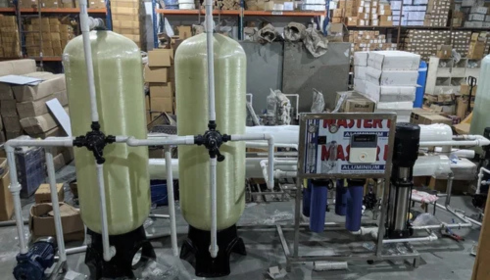Water is one of those behind-the-scenes essentials that rarely gets the attention it deserves. At home, maybe you notice hard water spots on glasses or a funny taste in your tap. But in business settings—restaurants, hotels, factories, breweries—water isn’t just a convenience. It’s the backbone of daily operations.
And yet, too often, companies treat water as an afterthought. They’ll invest heavily in machinery, buildings, or branding, but forget that all of those rely on a steady supply of clean water. It’s only when equipment starts breaking down, customers complain about taste, or regulations knock on the door that reality sets in. Water quality isn’t optional—it’s critical.
The Case for Filtration Beyond the Kitchen Sink
When people hear the word “filtration,” they picture pitchers in the fridge or maybe an under-sink unit at home. That’s fine for households, but businesses require something far more robust. A commercial water filtration system is designed to handle higher volumes, tougher contaminants, and nonstop demand.
Think about a coffee shop. Every cup brewed depends on water quality. If the water tastes flat or carries chlorine, no blend of beans will fix it. Now expand that idea to hotels running hundreds of showers a day, or food manufacturers relying on water as an ingredient. Filtration doesn’t just make things taste better—it protects reputation, equipment, and compliance.
Why Businesses Turn to Specialists
Managing water at scale isn’t something you just figure out with a few online tutorials. There are regulations to meet, unique contaminants in different regions, and specialized systems that require trained hands. That’s why working with an industrial water treatment company often makes more sense than trying to handle it in-house.
These companies bring experience, not just equipment. They know how to test, analyze, and design systems that fit specific industries. A brewery doesn’t have the same needs as a hospital. A textile plant faces different challenges than a hotel chain. The right partner understands those nuances and builds solutions that keep businesses running smoothly.
Reverse Osmosis: The Workhorse of Purification
There are lots of ways to clean water—filters, UV lights, chemical treatments—but one of the most reliable methods for large-scale use is reverse osmosis. It forces water through semi-permeable membranes, removing impurities at a microscopic level.
A commercial reverse osmosis system can handle thousands of gallons a day, producing water that’s consistent, safe, and high quality. It’s why you’ll find them in industries ranging from food processing to pharmaceuticals. And while the technology isn’t new, the efficiency and scalability of modern systems make them indispensable.
The Hidden Costs of Poor Water
It’s easy to underestimate the damage that untreated or poorly treated water can cause. Minerals build up inside boilers, pipes, and dishwashers, forcing them to work harder and break down sooner. Chlorine damages seals and corrodes equipment. Sediment clogs lines and reduces efficiency.
And that’s just the mechanical side. Customer-facing issues are even worse. Restaurants risk serving off-tasting food and drinks. Hotels may hear complaints about cloudy shower water or dry skin. Manufacturers could find their product consistency slipping, all because of something as simple as water.
The cost of addressing these after the fact—repairs, replacements, reputational damage—almost always outweighs the cost of prevention.
Local Variations, Global Needs
One of the biggest challenges businesses face is that water isn’t uniform. What works in one location may not work at another. A company with branches across multiple cities will quickly realize that each site has its own quirks—hardness levels, contaminants, seasonal variations.
This is where tailored solutions matter. A cookie-cutter system might work for a while, but true long-term reliability comes from customization. Water testing, system design, and ongoing service need to be specific to the location.
Maintenance: The Quiet Key
Installing a system is one thing. Keeping it running is another. Even the best filtration systems lose efficiency if filters aren’t replaced, membranes aren’t cleaned, or tanks aren’t serviced. And because water is invisible, it’s easy to let it slip until a problem becomes obvious.
Smart businesses put maintenance into their regular schedules. Some even partner with service providers who monitor systems remotely, spotting issues before they become disruptive. It’s not glamorous, but it’s what keeps operations smooth.
Environmental Responsibility
More companies are thinking about sustainability, and water plays a huge role in that. Wasting water, overusing chemicals, or ignoring efficiency isn’t just bad for the planet—it’s bad for business optics. Customers increasingly want to support companies that care about their footprint.
Modern water treatment systems are designed with this in mind. They recycle, minimize waste, and use energy more efficiently than ever before. That’s not just good PR; it’s smart economics.
The Human Factor
It’s easy to talk about systems and technology, but at the end of the day, water affects people. Employees who rely on it daily. Customers who notice the difference in taste, smell, or comfort. Families who trust that the products they buy are made with safe, clean ingredients.
That human connection is why water quality should never be treated as just another line item on a budget. It directly shapes experience, health, and trust.
Looking Ahead
The future of water treatment is getting smarter. Internet-connected sensors, predictive maintenance, AI-driven efficiency models—these tools are making it easier for businesses to monitor and optimize their systems. But no matter how advanced things get, the fundamentals remain the same: clean water requires care, attention, and investment.
Businesses that prioritize it will save money, avoid problems, and earn trust. Those that ignore it? They’ll eventually pay the price, one way or another.
Final Thoughts: Respect the Invisible Backbone
Water doesn’t grab headlines in boardrooms. It doesn’t sparkle like a new brand campaign or impress investors like shiny equipment. But quietly, in the background, it makes or breaks everything else.
For businesses, investing in proper filtration, treatment, and maintenance isn’t about bells and whistles—it’s about survival. It’s about giving employees, customers, and communities the clean water they deserve, while protecting the systems that keep everything running.
So the next time you sip coffee at a café, check into a hotel, or walk through a factory, take a moment to think about the invisible hero making it all possible. Water, and the systems that treat it, are the lifeline holding it all together.

